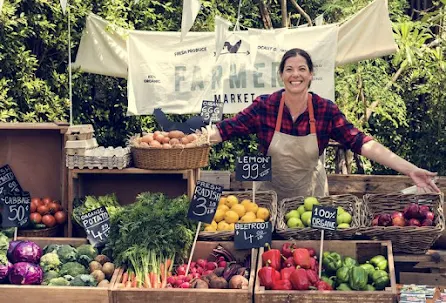Eating with the Seasons: Why Seasonal Produce is Better for You and the Planet
Hey there, health explorers!
Have you ever noticed how strawberries taste juicier in summer or how root veggies feel extra comforting in winter? That’s no accident — it's nature doing its thing. Today, we're diving into the world of seasonal eating — a timeless, wholesome practice that's not only better for your health but also a kind choice for our beautiful planet.
Let’s explore why eating with the seasons matters, how it connects you more deeply to the rhythms of the earth, and how you can start this simple, powerful habit today.
What Does It Mean to Eat Seasonally?
Eating seasonally means choosing fruits and vegetables that naturally grow during the current time of year in your region. Think fresh tomatoes in summer, apples in autumn, and leafy greens in spring.
This practice was the norm before global food supply chains made everything available year-round. But modern convenience has distanced many of us from nature’s cycles. By returning to seasonal eating, you're not just making a dietary change — you're embracing a healthier lifestyle that nurtures body, soul, and soil.
Health Benefits of Eating Seasonal Produce
1. Fresher, More Nutritious Food
Seasonal fruits and veggies are picked at their peak ripeness, which means:
-
More nutrients: Higher levels of vitamins, antioxidants, and minerals.
-
Better flavour: Juicier, crunchier, and more vibrant in taste.
-
Less spoilage: Local, in-season produce doesn’t travel far, so it stays fresh longer.
For example, spinach harvested in spring has significantly more vitamin C than spinach stored for months and shipped halfway across the globe.
2. Supports Your Body’s Natural Needs
Nature knows what your body needs at different times of the year. In summer, hydrating foods like cucumbers and watermelon help you cool down. In winter, hearty produce like pumpkin, carrots, and sweet potatoes provide grounding energy and nutrients to support immunity.
Why It’s Better for the Planet
1. Reduces Carbon Footprint
When you buy produce out of season, it’s often shipped from distant countries or grown in energy-intensive greenhouses. This contributes to:
-
High fuel use for transport
-
Excess packaging
-
More greenhouse gas emissions
Eating seasonally means eating more local food, which dramatically cuts down the distance your food travels — also known as “food miles.”
2. Promotes Sustainable Farming
Seasonal farming respects the natural life cycle of plants and the soil. It:
-
Reduces the need for chemical pesticides
-
Preserves biodiversity
-
Improves soil health
You’re also likely to support local farmers who grow food with care for the environment — a true win-win.
Seasonal Produce Guide (by Season)
Here’s a quick guide to get you started. Depending on your region, the exact items may vary slightly — but these are generally in season:
Spring
-
Asparagus
-
Peas
-
Lettuce
-
Spinach
-
Strawberries
Summer
-
Tomatoes
-
Zucchini
-
Corn
-
Berries
-
Peaches
-
Cucumbers
Autumn
-
Apples
-
Pears
-
Pumpkins
-
Sweet Potatoes
-
Beets
Winter
-
Carrots
-
Cabbage
-
Leeks
-
Citrus fruits (like oranges and mandarins)
-
Kale
How to Start Eating with the Seasons
1. Visit Your Local Farmers' Market
Farmers' markets are full of seasonal treasures. Not sure what’s in season? Just ask. Farmers love to share knowledge and tips.
2. Join a CSA (Community Supported Agriculture)
Subscribing to a CSA box gives you a regular delivery of fresh, local, seasonal produce. It's exciting — like a healthy surprise basket every week.
3. Learn to Preserve
Don’t want to say goodbye to summer berries? Learn how to:
-
Freeze fruits
-
Make homemade jams
-
Pickle vegetables
This way, you can enjoy seasonal goodness all year while avoiding industrially preserved foods.
4. Eat Simple, Earth-Friendly Meals
Try making dishes that highlight one or two seasonal ingredients instead of complex recipes with exotic items. For example:
-
Roasted pumpkin with rosemary (Autumn)
-
Fresh tomato and basil salad (Summer)
-
Stir-fried greens with garlic (Spring)
How Seasonal Eating Builds a Connection with Nature
When you start eating with the seasons, something beautiful happens. You begin to:
-
Notice subtle shifts in weather and sunlight
-
Look forward to certain fruits and veggies each year
-
Feel a deeper appreciation for natural rhythms
It’s like tuning into the heartbeat of the Earth — and that connection brings a kind of peace that’s hard to describe but deeply healing.
Final Thoughts: Small Changes, Big Impact
Seasonal eating is not a trend — it's a timeless way of living in harmony with nature. It's about slowing down, being mindful, and celebrating the gifts of each season.
And the best part? It’s easy to begin.
So next time you’re shopping or planning meals, pause and ask:
“What’s in season right now where I live?”
That one question can start a journey toward better health, stronger communities, and a greener planet.
Pin or Bookmark for Later:
“Eating with the Seasons: Why Seasonal Produce is Better for You and the Planet”
Tag your seasonal meals with #HealthyIdeasSeasonal and share your connection with nature’s delicious rhythm.














